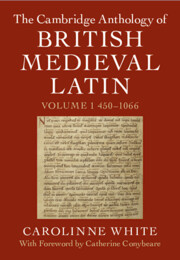Book contents
- Frontmatter
- Contents
- List of Maps
- Foreword
- Preface
- Acknowledgements
- List of Abbreviations
- Introduction
- Fifth Century
- Sixth Century
- Seventh Century
- Eighth Century
- I.7 Riddles (Aenigmata)
- I.8 ‘Anonymous of Whitby’, The Life of Gregory the Great
- I.9 Burginda, Letter to a Young Man
- I.10 Bede, Educational Writings
- I.11 Two Lives of St Cuthbert
- I.12 Wealdhere, Letterto Berhtwald, Archbishop of Canterbury
- I.13 Berhtwald, Archbishop of Canterbury, Letter about a Slave Girl, toForthhere, Bishop of Sherborne
- I.14 Ælfflæd of Whitby, Letter to Abbess Adolana in Germany
- I.15 Eddi, The Life of Wilfrid
- I.16 Two Lives of Ceolfrith, Abbot of Wearmouth-Jarrow
- I.17 Bede, The Ecclesiastical History of the English People
- I.18 Bede, Letter to Bishop Ecgberht
- I.19 Cuthbert, Abbot of Wearmouth-Jarrow
- I.20 Felix, The Life of St Guthlac
- I.21 The Letters of Boniface’s Circle
- I.22 King Æthelbald of Mercia Grants Abbess Eadburg of Thanet Exemptionfrom Tax
- I.23 Willibald of Mainz, The Life of St Boniface
- I.24 Hugeburc of Heidenheim, The Life of Willibald, Bishop of Eichstätt
- I.25 Alchfrith, Prayer to Holy Mary
- I.26 Alcuin, The Life of St Willibrord (from the Prose and VerseVersions)
- I.27 Alcuin, Dialogue on Grammar: Two Pupils Discuss the Parts ofSpeech with Their Master
- I.28 The Coming of the Vikings and the Destruction of Lindisfarnein 793
- Ninth Century
- Tenth Century
- Eleventh Century
- Select Bibliography for Volume I
- General Index
- Index of Passages Cited
I.7 - Riddles (Aenigmata)
from Eighth Century
Published online by Cambridge University Press: 11 January 2024
- Frontmatter
- Contents
- List of Maps
- Foreword
- Preface
- Acknowledgements
- List of Abbreviations
- Introduction
- Fifth Century
- Sixth Century
- Seventh Century
- Eighth Century
- I.7 Riddles (Aenigmata)
- I.8 ‘Anonymous of Whitby’, The Life of Gregory the Great
- I.9 Burginda, Letter to a Young Man
- I.10 Bede, Educational Writings
- I.11 Two Lives of St Cuthbert
- I.12 Wealdhere, Letterto Berhtwald, Archbishop of Canterbury
- I.13 Berhtwald, Archbishop of Canterbury, Letter about a Slave Girl, toForthhere, Bishop of Sherborne
- I.14 Ælfflæd of Whitby, Letter to Abbess Adolana in Germany
- I.15 Eddi, The Life of Wilfrid
- I.16 Two Lives of Ceolfrith, Abbot of Wearmouth-Jarrow
- I.17 Bede, The Ecclesiastical History of the English People
- I.18 Bede, Letter to Bishop Ecgberht
- I.19 Cuthbert, Abbot of Wearmouth-Jarrow
- I.20 Felix, The Life of St Guthlac
- I.21 The Letters of Boniface’s Circle
- I.22 King Æthelbald of Mercia Grants Abbess Eadburg of Thanet Exemptionfrom Tax
- I.23 Willibald of Mainz, The Life of St Boniface
- I.24 Hugeburc of Heidenheim, The Life of Willibald, Bishop of Eichstätt
- I.25 Alchfrith, Prayer to Holy Mary
- I.26 Alcuin, The Life of St Willibrord (from the Prose and VerseVersions)
- I.27 Alcuin, Dialogue on Grammar: Two Pupils Discuss the Parts ofSpeech with Their Master
- I.28 The Coming of the Vikings and the Destruction of Lindisfarnein 793
- Ninth Century
- Tenth Century
- Eleventh Century
- Select Bibliography for Volume I
- General Index
- Index of Passages Cited
Summary
Aldhelm wrote a set of 100 short riddles, following in the footsteps of earlier writers in this genre, such as Symphosius. Examples are also given here from the collections by other early eighth-century writers, namely Tatwine, Hwætberht and Boniface, including several different ways of writing a riddle on the popular subject of a pen. The riddle genre was also popular in Old English.
- Type
- Chapter
- Information
- The Cambridge Anthology of British Medieval Latin , pp. 95 - 104Publisher: Cambridge University PressPrint publication year: 2024

